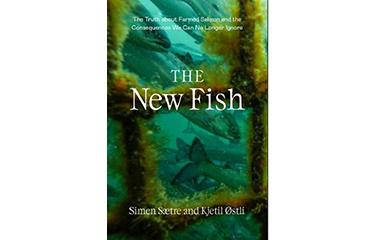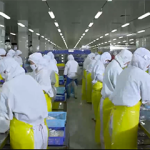New book from Patagonia goes after salmon aquaculture

A new book-length investigation into salmon aquaculture pushes back against the industry’s claim that farm-raised salmon is a healthy, environmentally friendly seafood option, according to publisher Patagonia.
Written by Norwegian journalists Simen Saetre and Kjetil Ostli, “The New Fish: The Truth about Farmed Salmon and the Consequences We Can No Longer Ignore” purports to tell the story of “how a once healthy food source became poison for the planet and for people.” The authors’ five-year investigation traces salmon aquaculture back to its emergence in 1970s, when it was presented as a healthier protein option and an environmentally sustainable food source. But while the new farm-raised salmon industry boomed, the authors contend that the practice “has come at high cost to the environment and wild salmon.”
Originally published in Norway in 2021, Patagonia Founder Yvon Chouinard brought the book to the attention of the company’s publishing program, which purchased the translation rights for the U.S. market.
“Yvon feels, and we agree, that it is a vital resource in Patagonia’s ongoing campaign to eliminate net-pen salmon farming,” Karla Olson, director of Patagonia’s publishing program, said.
The paperback book is due out 11 July.
The outdoor clothing and gear provider is opposed to most forms of aquaculture and has published media attacking the practice in the past. Chouinard executive produced a feature-length documentary called “Artifishal” in 2019, which criticized both fish hatcheries and net-pen aquaculture. Patagonia also released a video in 2020 titled “Take Back Puget Sound,” which called net-pen aquaculture “a dirty industry.”
In publishing the new translation, Patagonia suggests that net-pen bans in the U.S. states of Washington, California, Oregon, and Alaska are signs that momentum is shifting on the practice.
Salmon aquaculture has been a contentious issue in the Pacific Northwest for decades, peaking in 2017, when more than 260,000 Atlantic salmon escaped from a farm operated in Washington by Canada-based Cooke Aquaculture. That in turn led to the state government banning Atlantic salmon and other non-native fish farming in 2018.
Cooke responded to the ban by switching its operations to raise steelhead trout on its Washington farms. Conservative and environmental groups reacted by filing a lawsuit alleging the Washington Department of Fish and Wildlife (WDFW) had not adequately assessed the impact of the farms on water quality. The lawsuit ultimately failed, with the Washington Supreme Court ruling in 2022 that WDFW conducted its evaluation in compliance with the State Environmental Policy Act and upholding Cooke’s permit.
However, the company’s court victory was short-lived. Cooke’s last two leases were terminated by the government in November 2022, a move the company lambasted as counter to facts on the ground.
“Regulators and policymakers must responsibly follow the science and judicial precedents in making key decisions regarding marine aquaculture, which we do not believe was the case in this instance,” Cooke Aquaculture Vice President of Public Relations Joel Richardson said at the time. “A recent federal biological opinion and a recent Washington Supreme Court decision both reaffirm the state of the science that fish farming does not have an adverse impact on the environment. All of these factors are contrary to [Washington State Department of Natural Resources’] decision to not renew our leases.”
The company was then effectively barred from operating its net-pen leases after the state banned the practice in November 2022.
Photo courtesy of Patagonia






Share